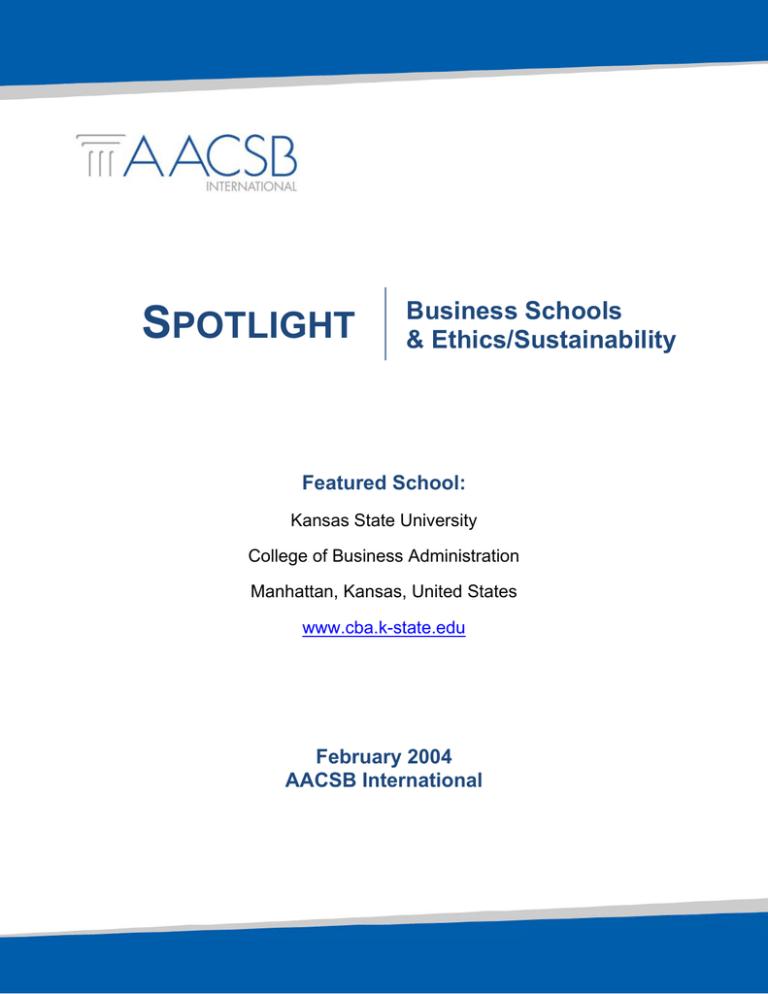
SPOTLIGHT
Business Schools
& Ethics/Sustainability
Featured School:
Kansas State University
College of Business Administration
Manhattan, Kansas, United States
www.cba.k-state.edu
February 2004
AACSB International
SPOTLIGHT | Business Schools & Ethics/Sustainability
Kansas State University | 2
Kansas State College of Business Administration –
Business Ethics Education Initiative
Kansas State University has a long-standing tradition of requiring ethics courses of its business students.
Starting as early as 1967, Kansas State embedded ethics coursework in its curriculum. Part of that
commitment stems from a core of four tenured/tenure-track professors teaching ethics in addition to
qualified adjuncts. Ethics is thoughtfully integrated into the following courses: strategy, organizational
behavior, leadership, small business consulting, as well as the other core courses such as management,
marketing, finance, accounting, and CIS. Undergraduates take a required course called “Business,
Government, and Society.” The required course for MBAs is “Legal and Social Issues in Business,” with
an additional elective course called “Professional Ethics.”
Kansas State University has a college-level education initiative founded and chaired by Dr. Diane
Swanson. This initiative has strong ties to the local business community with its own local advisory board.
Professor Clyde Jones, chair of the advisory board and one of the founders of ethics education at KSU
states, “As a professor, it was extremely challenging to lead students in discussions about issues which
were often shrouded in many shades of gray. My objective was simply to have the students understand
that there is an ethical dimension to many business decisions and that they should be aware of the social
consequences of their decisions.” One of the initiative’s projects involves teaching ethics with film as part
of an effort to increase awareness of business ethics education locally, regionally and nationally. To learn
more about Kansas State’s “Business Ethics Education Initiative” visit: http://www.cba.kstate.edu/index.aspx?NID=332.
Many Kansas State faculty have been vocal concerning the need for greater thought and resources being
devoted to business ethics education. In an article in the Lawrence Journal-World, “Business Education
Deficient on Ethics, Study Says,” Dr. Swanson stated, "I think it should shock the public given all the
damage that has come from illegal and unethical corporate conduct. Students need a course to explain
their future business responsibilities1."
Extra-curricular activities, such as the Business Ethics Speaker Series planned for Fall 2004, enhance
ethics education at Kansas State University. Students are also providing leadership, as members of
SIFE (Students in Free Enterprise), one of Kansas State’s student organizations in the college of
business, have worked with two KSU professors to develop a set of radio clips on business
ethics. This organization also delivers ethics materials to workshops given during the Kansas State
University SIFE High School Symposiums.
For Further Information Contact: Diane L. Swanson, Ph.D.
Founding Chair, Ethics Initiative
© AACSB International. All Rights Reserved.
SPOTLIGHT | Business Schools & Ethics/Sustainability
Kansas State University | 3
The Von Waaden Business Administration Professor
Professor of Management
18D Calvin Hall, Kansas State University
Manhattan, Kansas 66506
E-mail: swanson@ksu.edu
Phone: 1+785-532-4352
Acknowledgements: AACSB International is grateful for the assistance of Dr. Diane L. Swanson, Von
Waaden Business Administration Professor and Founding Chair of the Kansas State University Business
Ethics Education Initiative.
© AACSB International. All Rights Reserved.
SPOTLIGHT | Business Schools & Ethics/Sustainability
Kansas State University | 4
End Notes
1
Rombeck, Terry. (2003) “Business Education Deficient on Ethics, Study Says,” Lawrence Journal‐World, November 28, 2003. Electronic document, http://www2.ljworld.com/news/2003/nov/28/business_education_deficient/, accessed February 2004. © AACSB International. All Rights Reserved.




